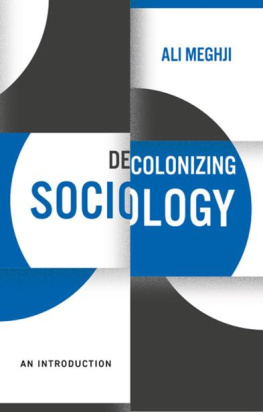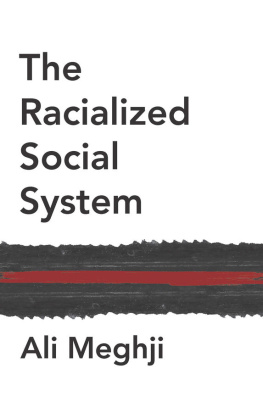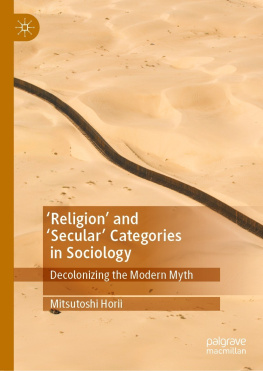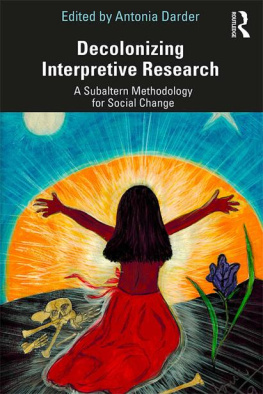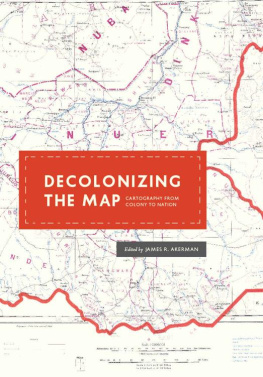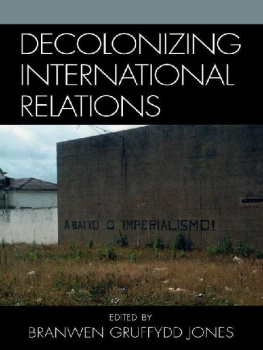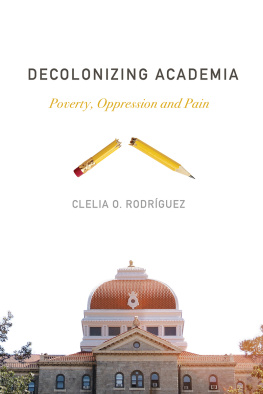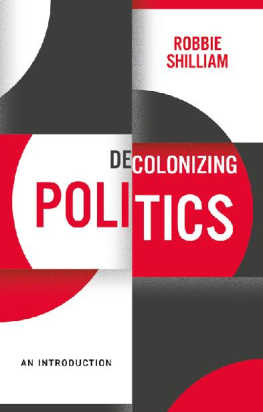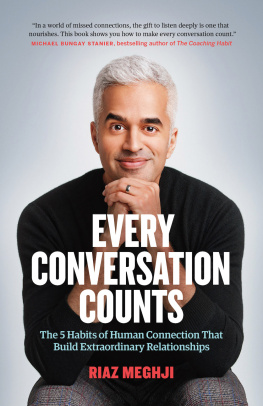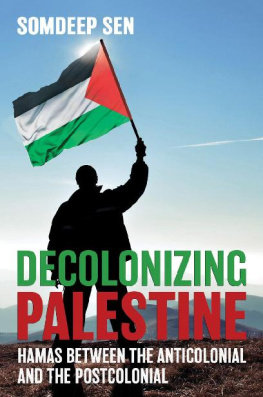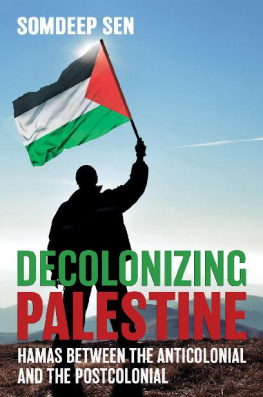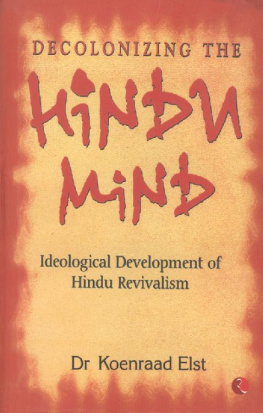Ali Meghji - Decolonizing Sociology: An Introduction
Here you can read online Ali Meghji - Decolonizing Sociology: An Introduction full text of the book (entire story) in english for free. Download pdf and epub, get meaning, cover and reviews about this ebook. year: 2021, publisher: Wiley, genre: Politics. Description of the work, (preface) as well as reviews are available. Best literature library LitArk.com created for fans of good reading and offers a wide selection of genres:
Romance novel
Science fiction
Adventure
Detective
Science
History
Home and family
Prose
Art
Politics
Computer
Non-fiction
Religion
Business
Children
Humor
Choose a favorite category and find really read worthwhile books. Enjoy immersion in the world of imagination, feel the emotions of the characters or learn something new for yourself, make an fascinating discovery.
- Book:Decolonizing Sociology: An Introduction
- Author:
- Publisher:Wiley
- Genre:
- Year:2021
- Rating:3 / 5
- Favourites:Add to favourites
- Your mark:
- 60
- 1
- 2
- 3
- 4
- 5
Decolonizing Sociology: An Introduction: summary, description and annotation
We offer to read an annotation, description, summary or preface (depends on what the author of the book "Decolonizing Sociology: An Introduction" wrote himself). If you haven't found the necessary information about the book — write in the comments, we will try to find it.
Decolonizing Sociology: An Introduction — read online for free the complete book (whole text) full work
Below is the text of the book, divided by pages. System saving the place of the last page read, allows you to conveniently read the book "Decolonizing Sociology: An Introduction" online for free, without having to search again every time where you left off. Put a bookmark, and you can go to the page where you finished reading at any time.
Font size:
Interval:
Bookmark:
- Ali Meghji: Decolonizing Sociology
- Robbie Shilliam: Decolonizing Politics
Ali Meghji
polity
Copyright Ali Meghji 2021
The right of Ali Meghji to be identified as Author of this Work has been asserted in accordance with the UK Copyright, Designs and Patents Act 1988.
First published in 2021 by Polity Press
Polity Press
65 Bridge Street
Cambridge CB2 1UR, UK
Polity Press
101 Station Landing
Suite 300
Medford, MA 02155, USA
All rights reserved. Except for the quotation of short passages for the purpose of criticism and review, no part of this publication may be reproduced, stored in a retrieval system or transmitted, in any form or by any means, electronic, mechanical, photocopying, recording or otherwise, without the prior permission of the publisher.
ISBN-13: 9781509541942
ISBN-13: 9781509541959 (pb)
A catalogue record for this book is available from the British Library.
Library of Congress Cataloging-in-Publication Data
Names: Meghji, Ali, author.
Title: Decolonizing sociology : an introduction / Ali Meghji.
Description: Cambridge, UK ; Medford, MA : Polity Press, 2020. | Includes bibliographical references and index. | Summary: An action plan for a globally equitable sociology-- Provided by publisher.
Identifiers: LCCN 2020023850 (print) | LCCN 2020023851 (ebook) | ISBN 9781509541942 (hardback) | ISBN 9781509541959 (paperback) | ISBN 9781509541966 (epub)
Subjects: LCSH: Sociology--Philosophy. | Postcolonialism. | Racism in sociology
Classification: LCC HM435 .M45 2020 (print) | LCC HM435 (ebook) | DDC 301.01--dc23
LC record available at https://lccn.loc.gov/2020023850
LC ebook record available at https://lccn.loc.gov/2020023851
by Fakenham Prepress Solutions, Fakenham, Norfolk NR21 8NL
The publisher has used its best endeavours to ensure that the URLs for external websites referred to in this book are correct and active at the time of going to press. However, the publisher has no responsibility for the websites and can make no guarantee that a site will remain live or that the content is or will remain appropriate.
Every effort has been made to trace all copyright holders, but if any have been overlooked the publisher will be pleased to include any necessary credits in any subsequent reprint or edition.
For further information on Polity, visit our website: politybooks.com
As I read through the pages of this book, I am reminded of numerous conversations about decolonial sociology that I have had with friends, colleagues and students. As usual, I owe thanks to many people from my institution at the University of Cambridge, including members of our Decolonizing Sociology working group such as Dr Mnica Moreno Figueroa, Dr Manali Desai, Dr Tiffany Page, Dr Ella McPherson, Dr Kathryn Medien, Dr Jeff Miley and Professor Sarah Franklin. Each of these scholars has helped develop dialogues around coloniality and sociology, and has helped sustain an engaging intellectual community dedicated to making sociology a more critical, equitable discipline. Of course, this intellectual community was not composed just of those employed as academics, but also copious numbers of students with a deep passion for generating critical sociological knowledge. My thanks go to each of these students, as well as all of the undergraduate and graduate students I have taught who have equally taught me about decolonial sociology. Also at Cambridge, the co-convenors of the Black Radicalism research group including Dr Tanisha Spratt, Dr Rachell Snchez-Rivera, Dr Daphne Martschenko and Sharon Walker also helped inspire understandings of transnational anti-colonial thought and practice. My understanding of transnational links between anti-racist and anti-colonial movements across the world was also furthered when I had the pleasure of co-interviewing Angela Davis when she visited Cambridge.
Outside of my institution, there are a range of people who have helped shape this book. Several years ago, Professor Gurminder K. Bhambra keynoted at a conference I organized on Social theory beyond whiteness. Gurminders presentation deepened my interest in inequality and canon formation in sociology, and her work continues to be a reference point for my understanding of why we need a decolonial sociology, and what this sociology ought to look like. With Gurminder, I am a co-convenor of the British Sociological Associations Post/decolonial Transformations working group, along with Dr Sara Salem, Dr Meghan Tinsley and Saskia Papadakis. Each of these intellectuals is pushing the boundaries of sociology in their work, and has helped instil a decolonial spirit into British and international academia. A close friend and collaborator, Dr Rima Saini, is also developing debates over decoloniality and curriculum reform in the social sciences, and I thank her for stimulating conversations as well as constant support.
Of course, the decolonial spirit is one which rejects hierarchies in favour of collaboration and conversation. I was fortunate enough to be on the receiving end of this spirit of kindness as I was forming the arguments of this book. While at Harvard, Professor Julian Go kindly made the time to have coffee with me, and helped provide advice on how a decolonial sociology is much more than an issue of race; this was a watershed moment for me in my understanding of decolonial sociology. At the same time, conversations with Professor Michle Lamont helped me to deepen my understanding of social theory, the sociology of valuation and canon formation. While visiting Cambridge, Professor Raewyn Connell also made the time to have coffee with me, providing me not only with an endless list of references to follow up, but also with explicit advice on how to write a review book; again, I am indebted to this help. On the theme of help, I also owe thanks to Professors Les Back and Satnam Virdee. Before my interest in decoloniality I was primarily a sociologist of race, and both Les and Satnam helped me to see how race scholarship in the United Kingdom was often formed around the principles of anti-imperial, decolonial sociology. I also owe thanks to mentors such as Professors John Solomos and Derron Wallace, both of whom are incredibly kind and supportive. Of course, I also owe a significant deal to the editorial team at Polity especially Jonathan Skerrett and Karina Jkupsdttir. Karina helped gather incredibly helpful reviews on drafts of my manuscript, while Jonathans editorial comments greatly improved this manuscripts clarity. Both Jonathan and Karina played a central role in developing this from a book proposal to a completed manuscript.
Lastly, I thank my partner, Emily Chan, and the newest addition to our family Maisie. Emily is loving, supportive, affectionate, and provides constant encouragement. She is my rock and foundation, and brings me constant happiness and joy.
Thank you, everybody.
As someone interested in decolonial theory, I often find myself reflecting on my relationship with sociology. I did not study sociology until part way through my undergraduate degree, and in this regard, I was never formally introduced to the works of Karl Marx, Max Weber or mile Durkheim. Not having sat down and systematically read Marx, Weber and Durkheim became a secret of mine that I kept close to my chest at the beginning of graduate school. Readers of this book will be pleased to know that since then I have become acquainted with such classical works, but it remains puzzling that three figures, two of whom did not even classify themselves as sociologists, and none of whom were regarded as sociologists by their contemporaries (Connell 1997), have come to hold so much symbolic weight in the field of sociology. Now as an advisor, I regularly get graduate students much less secretive than I was declaring anxieties to me that they arent familiar with the works of Marx, Weber and Durkheim, questioning whether that makes them bad sociologists.
Font size:
Interval:
Bookmark:
Similar books «Decolonizing Sociology: An Introduction»
Look at similar books to Decolonizing Sociology: An Introduction. We have selected literature similar in name and meaning in the hope of providing readers with more options to find new, interesting, not yet read works.
Discussion, reviews of the book Decolonizing Sociology: An Introduction and just readers' own opinions. Leave your comments, write what you think about the work, its meaning or the main characters. Specify what exactly you liked and what you didn't like, and why you think so.

